Rising Strong by Brene Brown

Author:Brene Brown [Brown, Brene]
Language: eng
Format: epub, mobi
ISBN: 9780812995831
Publisher: Spiegel & Grau
Published: 2015-08-25T10:00:00+00:00
Rumbling with Disappointment, Expectations, and Resentment
Often stories of falling are threaded with sadness, frustration, or anger, describing something that, for some reason, just didn’t turn out the way we hoped it would. We need to examine our story for phrases like, “I had my heart set on it,” or “I counted on this happening,” or “I just thought….” If expressions like these show up, we might be struggling with disappointment. Here is what you need to know about disappointment: Disappointment is unmet expectations, and the more significant the expectations, the more significant the disappointment.
The way to address this is to be up-front about our expectations by taking the time to reality-check what we’re expecting and why. Expectations often coast along under our radar, making themselves known only after they have bombed something we had high hopes for into rubble. I call these stealth expectations. Claudia recognized her stealth expectations when it came to going home for a visit with her family—for example, the idea that she should be able to have a “normal” night out with her sisters over pizza. If your story is full of question marks—places where you have scribbled “Huh?” or “What just happened?” or “Was that too much to ask?”—it is likely a story of stealth expectations and the disappointment they have produced.
As Anne Lamott said, “Expectations are resentments waiting to happen.” We have the tendency to visualize an entire scenario or conversation or outcome, and when things don’t go the way we’d imagined, disappointment can become resentment. This often happens when our expectations are based on outcomes we can’t control, like what other people think, what they feel, or how they’re going to react.
It’s going to be a great holiday! My sister-in-law is going to love her gift and be so impressed with dinner.
I can’t wait to share my project ideas with the team tomorrow. They’re going to be blown away.
For Steve and me, stealth expectations, disappointment, and resentment have been the sources of some of our most difficult arguments. About five years ago, we noticed a pattern where one of us would slip into resentment after a weekend of trying to jointly juggle our family’s hectic soccer–birthday party–sleepover–school project–church schedules along with our own personal plans. It’s so much easier when we are flying solo—but how on earth could it be easier for Steve to hold down the fort when I’m out of town? Why is it simpler for me to navigate a busy weekend when he’s on call and at the hospital for hours on end? Our arguments after weekends together always ended with one of us feeling resentment and going into blaming mode: You’re not helpful. You don’t add anything. You just make it harder. So painful.
I finally said to Steve, “I’m tired of this argument about it being easier without the other one here. It totally hurts my feelings. I feel like I don’t belong here. Something about the story we’re telling ourselves is not true. I don’t believe it.” So we started rumbling on the stories behind these arguments.
Download
This site does not store any files on its server. We only index and link to content provided by other sites. Please contact the content providers to delete copyright contents if any and email us, we'll remove relevant links or contents immediately.
Tools of Titans by Timothy Ferriss(7234)
Change Your Questions, Change Your Life by Marilee Adams(6872)
Deep Work by Cal Newport(5857)
Man-made Catastrophes and Risk Information Concealment by Dmitry Chernov & Didier Sornette(5039)
Big Magic: Creative Living Beyond Fear by Elizabeth Gilbert(4937)
Digital Minimalism by Cal Newport;(4883)
The Slight Edge by Jeff Olson(4860)
The Motivation Myth by Jeff Haden(4675)
Stone's Rules by Roger Stone(4561)
Ego Is the Enemy by Ryan Holiday(4334)
The Laws of Human Nature by Robert Greene(4189)
Tuesdays with Morrie by Mitch Albom(4005)
Playing to Win_ How Strategy Really Works by A.G. Lafley & Roger L. Martin(3951)
Rising Strong by Brene Brown(3900)
Eat That Frog! by Brian Tracy(3700)
Skin in the Game by Nassim Nicholas Taleb(3626)
The Money Culture by Michael Lewis(3454)
Skin in the Game: Hidden Asymmetries in Daily Life by Nassim Nicholas Taleb(3403)
Bullshit Jobs by David Graeber(3379)
